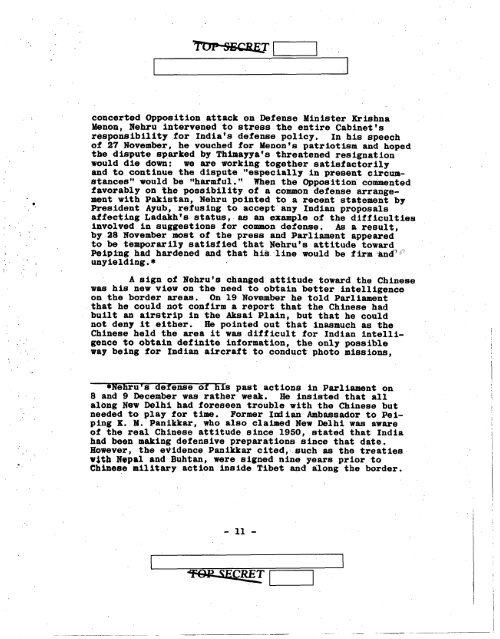The Sino-Indian Border Dispute Section 2: 1959-61 - The Black Vault
The Sino-Indian Border Dispute Section 2: 1959-61 - The Black Vault
The Sino-Indian Border Dispute Section 2: 1959-61 - The Black Vault
You also want an ePaper? Increase the reach of your titles
YUMPU automatically turns print PDFs into web optimized ePapers that Google loves.
concerted Opposition attack on Defense Minister Krishna<br />
Menon, Behru intervened to stress the entire Cabinet's<br />
responsibility for India's defense policy. In his speech<br />
of 27 November, he vouched for Menon's patriotism and hoped<br />
the dispute sparked by Thlmagya's threatened resignation<br />
would die down: we are working together satisfactorily<br />
and to continue the dispute '*especially in present clrcuarstances"<br />
would be "harmful. '* When the Opposition conunented<br />
favorably on the possibility of a common defense arrangemerit<br />
with Pakistan, Nehru pointed to a recent stalement by<br />
President Ayub, refusing to accept any <strong>Indian</strong> proposals<br />
affecting Ladakh's status, as an example of the difficulties<br />
involved in suggestions for common defense. As a result,<br />
by 28 November most of the press and Parliament appeared<br />
to be temporarily satisfied that Nehru's attitude toward<br />
unyielding. *<br />
\ Pelping had hardened and that hi& line would be firm and""'<br />
I<br />
A sign of Nehru's changed attitude toward the Chinese<br />
was his new view on the need to obtain better intelligence<br />
on the border areas. On 19 Novamber he told Parliament<br />
that he could not confirm a report that the Chinese had<br />
built an airstrip in the Aksai Plain, but that he could<br />
not deny it either. He pointed out that Inasmuch as the<br />
Chinese held the area it was difffcult for <strong>Indian</strong> Intelligence<br />
to obtain definite information, the only possible<br />
way being for <strong>Indian</strong> aircraft to conduct photo missions,<br />
-.<br />
. .<br />
*Nehru's defense of his past actions in Parliament on<br />
8 and 9 December was rather weak. He insisted that all<br />
along New Delhl had foreseen trouble with the Chinese but<br />
needed to play for time. Former <strong>Indian</strong> Ambassador to Peiping<br />
It. M. Panikkar, who also claimed New Delhi w m aware<br />
of the real Chinese attitude since 1950, stated that India<br />
had been making defensive preparations since that date.<br />
However, the evidence Panikkar cited, such aa the treatiels<br />
w$th Nepal and BUhtan, were signed nine years prior to<br />
Chinese military action inside Tibet and along the border.<br />
I<br />
- 11 -<br />
I<br />
i<br />
j !





![Combat Support in Korea [270 Pages] - The Black Vault](https://img.yumpu.com/49796461/1/190x71/combat-support-in-korea-270-pages-the-black-vault.jpg?quality=85)











